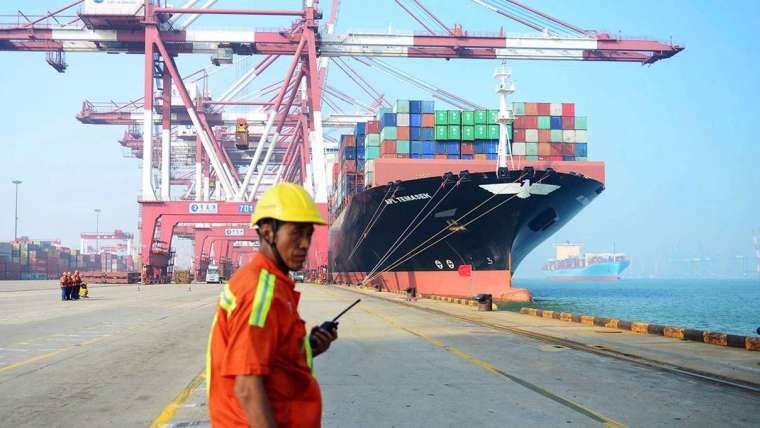
The widely acclaimed globalisation of the post-Cold War era is now running in reverse. A protracted slowdown in global trade has been reinforced by persistent pandemic-related supply-chain disruptions, ongoing pressures of the US-China trade war, and efforts to align cross-border economic ties with geostrategic alliances (“friend-shoring”). These developments tighten the noose on China, arguably the country that has been the greatest beneficiary of modern globalisation.
Of the many metrics of globalisation, including financial, information, and labour flows, the cross-border exchange of goods and services is most closely tied to economic growth. Largely for that reason, the slowdown in global trade, which commenced in the aftermath of the 2008-09 global financial crisis and intensified in the COVID-19 era, points to a sea change in globalisation. While global exports went from 19% of world GDP in 1990 to a peak of 31% in 2008, in the thirteen years that followed (2009-21), global exports have averaged just 28.7% of world GDP. Had world exports expanded on a 6.4% trajectory – halfway between the blistering 9.4% pace of 1990-2008 and the subdued post-2008 rate of 3.3% – the export share of global GDP would have soared to 46% by 2021, far above the actual share of 29%.
China’s gains from the globalisation of trade have been extraordinary. In the decade prior to China’s 2001 accession to the World Trade Organisation, Chinese exports averaged just 2% of total world exports. By 2008, that share had risen nearly fourfold, to 7.5%. China had timed its WTO membership bid perfectly, just when the global trade cycle was on a major upswing. While the financial crisis took a brief toll on Chinese export momentum, the interruption was short-lived. By 2021, Chinese exports had surged to 12.7% of world exports, well above the pre-2008 peak.
China is unlikely to maintain this performance. Overall growth of global trade is slowing, and China’s slice of the trade pie is under mounting pressure.
The ongoing trade war with the United States is especially problematic. During the first phase of China’s export-led growth surge in the aftermath of WTO accession, the US was consistently China’s largest source of external demand. Largely due to former US President Donald Trump’s tariffs, that is no longer the case. By 2020, US imports of Chinese goods and services had fallen 19% below the peak levels of 2018. Despite rebounding sharply on the heels of the US economy’s post-pandemic snapback, in 2021, US imports from China remained 5% below the 2018 peak. Partial tariff rollbacks for selected consumer products, which President Joe Biden’s administration is apparently considering as an anti-inflation gambit, are unlikely to jump-start bilateral trade.
At the same time, enduring pandemic-related supply-chain disruptions are likely to take a sharp toll on China and the rest of the world. Over the six months ending in April, a “global supply chain pressures index” constructed by researchers at the Federal Reserve Bank of New York averaged 3.6, well above the 2.3 reading in the first 21 months following the February 2020 onset of pandemic-related lockdowns, and sharply higher than the “zero” reading associated with the absence of supply-chain disruptions.
This is a big deal for a world connected by supply chains. Global value chains accounted for more than 70% of the cumulative growth in overall global trade from 1993 to 2013, and China has enjoyed an outsize share of this GVC-enabled expansion. As supply-chain disruptions persist, exacerbated by China’s zero-COVID policies, pressures on Chinese and global economic activity are likely to remain intense.
Mounting geostrategic tensions are the wild card in deglobalisation, especially their implications for China. “Friend-shoring” in effect turns Ricardo’s efficiency calculus of cross-border trade into an assessment of the security benefits that come from strategic alliances with like-minded countries. China’s new unlimited partnership with Russia looms especially relevant in this regard. With China edging closer to crossing the line by providing support to Russian military efforts in Ukraine, the US has recently moved to impose sanctions on five more Chinese companies through its so-called Entity List.
Moreover, Chinese purchases of Russian energy products provide a major source of support to the Russian economy, thereby countering the impact of unprecedented Western sanctions. That raises the risk of China being judged guilty by association. Meanwhile, signs of financial de-globalisation are also evident, with China steadily reducing its holdings of US treasuries to levels not seen since 2010 – hardly a comforting development for a saving-short, deficit-prone US economy.
The US is hardly an innocent bystander in this outbreak of geostrategic tensions. On-again, off-again rumors of an upcoming trip to Taiwan by House Speaker Nancy Pelosi clearly flirt with China’s tripwires regarding what it has defined as one of its core interests. The same can be said of bipartisan support for anti-China legislation slowly making its way through the US Congress.
Just as Russian President Vladimir Putin has attempted to justify his unconscionable aggression in Ukraine as a defense against NATO enlargement, China’s longstanding fears of American containment play to similar anxieties within Chinese leadership circles. Henry Kissinger, the architect of the modern-day US-China policy, recently warned of America’s penchant for “endless confrontation” with China and appealed for “Nixonian flexibility” to resolve an increasingly dangerous conflict. But, as I argue in my upcoming book, Accidental Conflict, it will take far more than that to bring Sino-American conflict escalation to an end.
Globalisation was always a catchy term in search of a theory. Yes, trade was the glue that fostered integration of the world economy. But it was hardly the rising tide that lifted all boats. With the world beset by climate change, pandemics, and a shocking new war in Europe – to say nothing of mounting inequality and related social and political tensions – the defense of globalisation is in tatters. And China may well have the most to lose.
Stephen S. Roach is a faculty member at Yale University and the author of Unbalanced: The Codependency of America and China and the forthcoming Accidental Conflict: America, China, and the Clash of False Narratives (Yale University Press, November 2022). Copyright: Project Syndicate, 2022, published here with permission.
10 Comments
Promote globalization because the West can make $$.
Promote de-globalization because the West cannot make $$.
Simple as.
Yeah, yeah we know. China does everything for the good of humanity. Pull the other one Wumao, it plays Jingle Bells.
More like,
promote globalisation because the West can make $$ in a period of unparalleled peace (in all of history) between sovereign nations.
promote de-globalisation because of rising geopolitical tensions. And globalisation made other countries $$ who are now using them to violate international law and directly threaten Western security interests.
Globalization is not ending, but a more fierce of fighting for the driver seat becomes more and more apparent.
Of course China will lose the most from deglobalisation. And that’s mainly self inflicted.
if you really understand how the west benefit from the globalization, you will realize, it's the west will lose much more. the old model is basically, US print cash, then buys Chinese products, then Chinese deposit the cash into USD reserves, then cycle again.
so you will see, China does not get anything but the green paper from US, and for those hard earn green paper, they had to give it back to US with interest returns lower than inflation.
you see why China is actually doing better not doing business with US.
yeah, nah
If China suffers in future, they have only got themselves to blame.
They abused the trust of free trade shamelessly.
since it always takes two parties to play the trade, you can blame China for fowl plays, but the west, by west I mean US, is not exactly an angel. for example, the WTO has almost been dismantled since Trump.
Which reminds me, have you noticed the price rise of chicken lately?

We welcome your comments below. If you are not already registered, please register to comment
Remember we welcome robust, respectful and insightful debate. We don't welcome abusive or defamatory comments and will de-register those repeatedly making such comments. Our current comment policy is here.